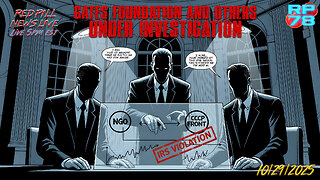Premium Only Content

The Machine That Failed: Technology and Fate in A Connecticut Yankee
**DONATE HERE IF YOU WISH TO HELP FUND THIS PROJECT: http://ko-fi.com/bibliocultist**
Mark Twain’s A Connecticut Yankee in King Arthur’s Court is often remembered as a funny story about a 19th-century mechanic bringing democracy, railroads, and dynamite to Camelot. But beneath the satire lies one of the darkest, most prophetic novels in American literature — a scathing critique of progress, technology, and the myth of American exceptionalism. In this review, we dive into how Twain spent nearly a decade crafting a novel that begins as a comedy and ends in bloodshed and despair, exposing the illusion that reason, science, or good intentions can overcome entrenched power, tradition, and human folly. We explore Twain’s deepening fatalism, his contradictory views on free will, and how Hank Morgan — the self-proclaimed “Yankee” reformer — becomes something dangerously close to a dictator in the name of progress.
*all music and content copyright BiblioCultist.com*
#MarkTwain #ConnecticutYankee #AmericanExceptionalism #AmericanImperialism #PoliticalSatire #Fatalism #CritiqueOfProgress #TechnologyAndSociety #ClassicLiterature #BookReview #DarkSatire #FreeWill #UtopiaDystopia #PhilosophyInFiction #AmericanLiterature #Satire #TwainQuotes #EmpireAndDemocracy #MustReadBooks #biblio #cultist #bibliocultist
**SHOW NOTES**
1. Samuel Langhorne Clemens, better known by his pen name Mark Twain, was America’s greatest humorist, a master storyteller, and a razor-sharp critic of human folly. Born in 1835 in Florida, Missouri, he rose from humble beginnings as a riverboat pilot on the Mississippi to become one of the most iconic voices in American literature.
2. Mark Twain worked on A Connecticut Yankee in King Arthur’s Court intermittently for nearly a decade, beginning sketches as early as 1884 before completing the novel in 1889 — a period marked by personal obsession, financial pressures, and deepening cynicism. Originally conceived as a humorous satire of chivalric romance, the story evolved over years of false starts and revisions into something darker and more complex: a blistering critique of monarchy, organized religion, and the illusion of progress.
3. The idea of "American exceptionalism" — the belief that the United States is uniquely destined to embody liberty and democracy — often masks a historical amnesia. Far from being an original blueprint, the American political experiment draws deeply from older traditions: the democratic ideals of ancient Athens, the republican structures of Rome, the civic humanism of Renaissance Florence and Venice, and the Enlightenment revolutions in France and England. Concepts like checks and balances, civic virtue, and representative government were not invented in Philadelphia, but studied, borrowed, and adapted from centuries of European and classical thought.
4. Fatalism — the belief that all events are predetermined and therefore inevitable — runs deeply through Mark Twain’s later work, especially A Connecticut Yankee in King Arthur’s Court. While the novel’s protagonist, Hank Morgan, champions reason, technology, and individual agency as tools to reshape society, Twain undercuts this optimism with a dark fatalism: no matter how much Hank plans or reforms, history resists change, institutions collapse back into tyranny, and progress ends in catastrophic failure. The ending — where Hank’s modern utopia is drowned in blood and superstition — suggests not triumph, but inevitability.
5. Since the 1970s, the cost of living has outstripped wage growth for many workers worldwide, shrinking purchasing power across generations and exacerbating inequality, though the severity varies by region. According to the International Labour Organization's Global Wage Report 2024-25, global real wages grew just 1.8% in 2023—recovering from a -0.9% drop in 2022 when inflation outpaced nominal pay—but cumulative gains since 2000 remain modest, with productivity rising faster than wages in most economies.
6. American imperialism is distinct not in its expansionist actions — which echo older empires — but in its ideological self-justification: the conviction that spreading democracy, freedom, and free markets is a moral imperative, even when enforced by military or economic power. Unlike traditional empires that openly claimed dominance for glory or wealth, the U.S. often frames its interventions as altruistic, portraying conquest or influence as "liberation" or "nation-building." This crusading idealism — rooted in notions of American exceptionalism — fuels an obsession with exporting values as if they are universal blueprints, dismissing alternative models as backward or illegitimate.
-
 LIVE
LIVE
Red Pill News
2 hours agoNGO’s Caught Funding CCP on Red Pill News Live
3,421 watching -
 LIVE
LIVE
GritsGG
3 hours agoDuos into Quads! #1 Most Wins 3880+!
44 watching -
 LIVE
LIVE
Spartan
2 hours agoFirst playthrough of First Berserker Khazan
14 watching -
 LIVE
LIVE
ReAnimateHer
6 hours ago $0.11 earnedScreaming, Failing, and Probably Dying – A Normal Night in Dead by Daylight
25 watching -
 LIVE
LIVE
LFA TV
20 hours agoLIVE & BREAKING NEWS! | WEDNESDAY 10/29/25
1,128 watching -
 1:12:02
1:12:02
vivafrei
3 hours agoThe Rise of Mamdami & the Fall of New York! Ice Activits ARRESTED! Ostrich Farm UPDATE! & More!
84.1K54 -
 16:31
16:31
Clintonjaws
6 hours ago $8.89 earnedICE Rioters Getting Arrested - This Is Priceless
15.2K9 -
 1:05:34
1:05:34
The Quartering
4 hours agoJob Economy Collapsing, Food Wars Start Friday & The War On Tucker Carlson
117K36 -
 3:40:16
3:40:16
Barry Cunningham
3 hours agoPRESIDENT TRUMP EVENTS IN SOUTH KOREA | MIKE JOHNSON SHUTDOWN DAY 29 PRESSER | MORE NEWS!
34.8K13 -
 59:38
59:38
The HotSeat
2 hours agoAmerican Politics Are Really NOT This HARD!!!!
14.7K5